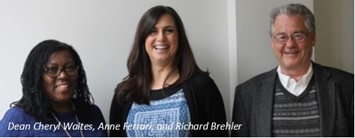Wayne State M.S.W. student wins manuscript contest by exploring challenges of end-of-life social work practice

M.S.W. student Anne Ferrari has won the Wayne State School of Social Work's prestigious Elizabeth N. Brehler student manuscript competition with an exploration of her frustration at the end-of-life health care decisions made by the families of nursing home patients in her care.
Established in 1992, the annual Brehler competition awards $3,000 to the essayist who best describes the way his or her personal and professional values conflict with the obligations of social work practice. Ferrari, who has worked in nursing homes for the past 16 years, impressed the selection committee with her candid reflections on the anger she has felt toward families who unintentionally prolong the suffering of their loved ones by resisting palliative and hospice care as well as at the clinicians who avoid engaging these families in honest discussions about the futility of prolonged medical interventions.
Describing the metabolic processes that occur in terminal patients and statistics showing their poor response to resuscitation efforts, Ferrari supports her contention that it is frequently both futile and harmful to continue performing medical procedures on patients in the end stages of disease. She admits judging family members for being selfish in refusing palliative care for their loved ones and feeling "infuriated" by their inability to come to terms with their loved ones condition. Her challenge, as she describes it, was to better understand why families succumb to denial and resist hospice and to remain mindful of her ethical responsibility as a social worker to respect their right to self-determination.
"For many reasons I realized that I needed to conquer these biases and judgments in order to be an effective advocate not only for the patient but also for the family," writes Ferrari, who for the past seven years has worked at Sanctuary at Fraser Villa conducting patient assessments, advising families, and providing grief counseling. "Although my anger was coming from a place of compassion for the patient, I recognized that I also needed to be more compassionate and understanding towards the family. "¦ Recognizing and admitting to myself that these were judgmental and negative feelings I was experiencing was the first step for me in reconciling them."
Ferrari, who will earn her M.S.W. on May 5 and plans to pursue a career in hospice social work, said she was able to overcome her negative feelings by better adhering to the social work core value of competency and the professional imperative to continually increase professional knowledge and skills and apply them. She also began actively to imagine herself in the place of family members when evaluating their decisions and to share her feelings about these decisions with other members of her interdisciplinary team who could help put them in perspective.
Writing about the tension between her personal and professional obligations for the Brehler competition has been validating, said Ferrari.
"I struggled initially when writing the essay until I realized it was because I was not being fully honest, that I feared being judged for my struggle," Ferrari said. "Then I went back and read some of the winning manuscripts and was struck by the writers' fearlessness in admitting their feelings. That's what brought the story out in me, and also what reaffirmed for me how passionate I am about end-of-life care."
Ferrari's faculty mentor for the competition was Distinguished Social Work Professor Jerrold Brandell. He said Ferrari's essay "represents a near-perfect blend of the elements we believe to be essential in a winning Brehler paper: superior scholarship, a compelling personal narrative, the identification of an ethical dilemma, and finally, what Bettelheim (though in a different context) termed 'the struggle for meaning.'"
"Anne's 'struggle' was primarily an internal one, as she gradually grew to appreciate the complexity of the decision-making processes that patients and their families confront in connection with the end-of-life," Brandell said. "Anne was gradually able, through introspection, to feel as much compassion for the families of her patients, even when she disagreed with their decisions, as she had always felt for the patients themselves."